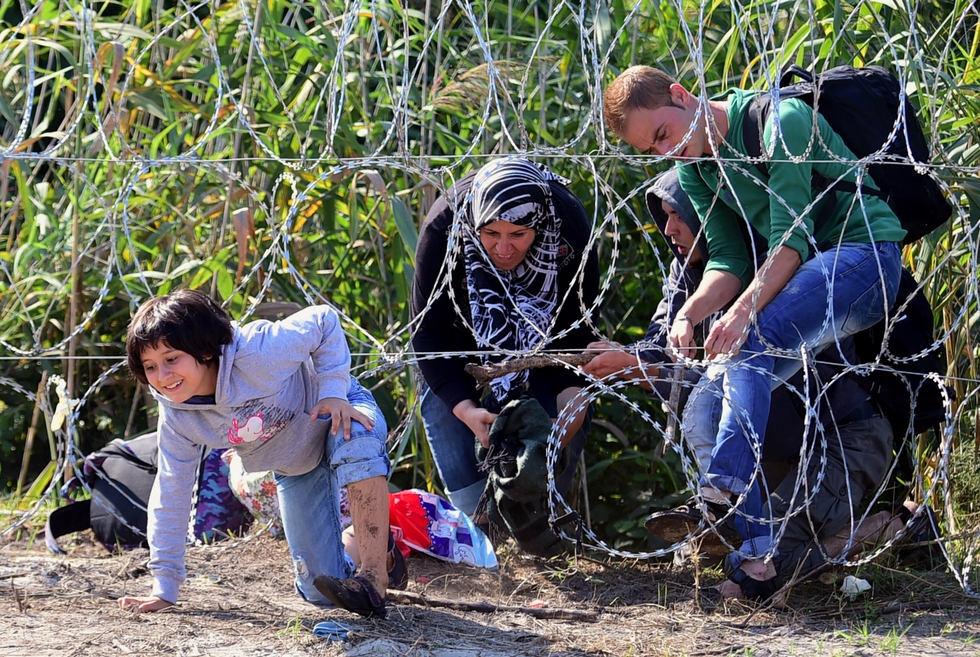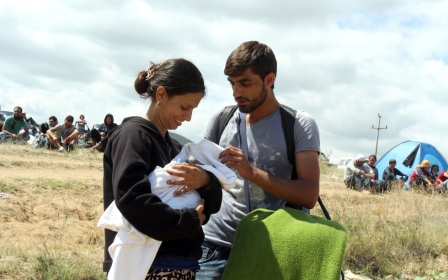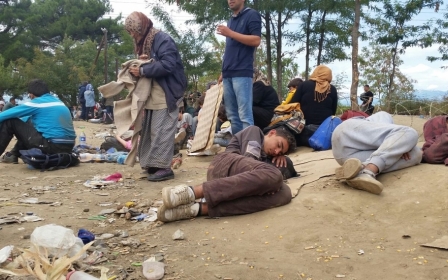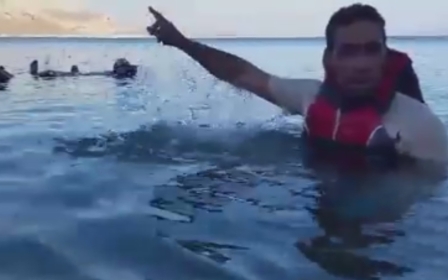One man's journey to Europe: Syria's Givara reaches Germany

Middle East Eye is following the story of the young Syrian director and actor Givara al-Ali as he makes his way across Europe to seek asylum.
Givara first fled his native Syria to Turkey, before reaching Greece where he made a controversial video that showed migrants trying to swim ashore amidst a sea of dead bodies. The video was not designed to be real, but quickly went viral as people mistook it for genuine coverage.
After two weeks, he made his way north to the Macedonian border, where he witnessed fierce clashes between refugees and border police, who were trying to limit the flow of refugees to the small Balkan country after it had announced a state of emergency due to the unprecedented influx. After entering the country, he took a taxi to the Serbian border, and from there made it to the Hungarian border. This is the latest part of his voyage in Givara's own words.
Getting past the Hungarian border was a long arduous task. It was very difficult and took us about eight hours. On the way, we saw three couples, husbands and wives with their children. They begged me to take them in, as I had already communicated beforehand on Whatsapp that I was going to find a new road to get past the border that no one else had taken before. [Syrian refugees use social media to document and communicate to others about how to reach Europe.]
The guys with me didn’t want more people joining our group, but I relented. I said, perhaps we will pass because we will have children with us.
We took off. The road was so hard. There were so many checkpoints. The Hungarian government had employed the use of floodlights at random points and every time they would turn on we would dive into the nearest valley, usually wet from the rain, and rest for five minutes.
At 4am we glimpsed a gas station ahead of us. Everyone else hid themselves, and one of the men and myself went up to see if we could buy some food. We were shocked when we saw people running towards us. We thought they were the police and we began running. But then they started calling out, “Do you need a car? Do you need a lift?”
It turned out that they were taxi drivers, waiting for refugees to come their way! We stopped and asked them how much it would take to get to the capital. They told us 300 euros ($340). We agreed to take three cars.
The five guys and I bid farewell to the families, and got in the first car. The driver took 1,500 euros ($1,683) from us in total to take us to the capital.
We got there at 7am on Monday. The driver told us about a hotel called Istanbul Hotel and dropped us off in the direction of the hotel. We thought that perhaps there would be other Arabs there who could tell us where to go from here since we didn’t have the slightest idea.
We arrived at the hotel. It turned out it was controlled by a mafia-like group, whose task was to send refugees to Germany and Austria. As soon as we got in, a young man began interrogating us. He asked if we have official stamps from the Hungarian government. We told him no. He said that we were in danger, so we asked what the solution was. He gave us yellow ribbons and told us to wrap them around out wrists. “These ribbons will keep you safe. They cost 15 euros ($17) each.”
We paid and put them on, I told him that we wanted to go to Germany. He pointed to another man next to him and told us to talk to him.
All the men at the hotel by the way, the ones involved in this “mafia”, were Syrian and Iraqis, most of them Kurds.
I asked the next man how much it cost to go to Germany. He replied it was 600 euros, or $673. One of the men in my group said that he only had 550 euros. The man from the hotel looked at him and said, “The yellow band around your wrist will keep you safe for only three more hours. After that, get out of here.”
I told him, “Relax, I’ll pay the difference for him.”
Suddenly, police cars were at the entrance of the hotel. We froze, not knowing what to do. One of the men working in the hotel ran outside and talked to them. The police glanced at us and then left without a word. It seemed pretty obvious to me that the hotel “mafia” and the police were in cahoots with each other, purely on a business level.
Anyway, I told the men we were ready to leave at once. They told us to go outside the back entrance of the hotel, where we will find a garden. Beyond that is another garden, and this is where we found our modes of transportation, brand new sleek-looking cars, each more modern looking than the other.
We got in, six of us plus the driver. It took us eight hours to reach Germany. The car was very comfortable.
We got past the German borders, and from there we walked around, not knowing where we were going. I don’t know the name of the town we were in. Pretty soon the police caught us. To be honest, I don’t know how we didn’t get caught sooner! They brought us to the station. While we were waiting, four other men and a family who were also caught were brought in the station. There was a flurry of action from the officers, who told us to wait in the front room to be taken to the nearest camp. They went in to the backroom to get out files and paperwork. I told my friends, let’s leave. If they catch us again, we’ll just tell them we went out to get food.
Givara: Each of us had a specific country he wanted to get to. Holland, Britain, Switzerland. In the end, we got caught by the Germans!
And so we left. We ran. Then we slowed down because we had no idea where the hell we were going. It was dark, and we kept walking until it was 6 am. We were only wearing shorts and t-shirts, and it had been raining almost non-stop. We felt like we were coming down with the flu. We couldn’t go to a hotel because we’d get caught again.
I got a train and went straight to Hamburg. I’m staying at the house of Syrian friends I’ve never met before but had helped them out financially a year ago, as they were getting ready to leave Syria.
I don’t want to stay in Germany; it’s too hectic. I still have my eyes set on Holland though. I’ll stay here for a few days before I start traveling again.
Givara: After we got caught by the German police, we escaped. We don't know where we are going. There is no one in the streets to ask for directions. Hopefully we won't get caught again and we'll reach Holland, Britain and Switzerland.
Middle East Eye propose une couverture et une analyse indépendantes et incomparables du Moyen-Orient, de l’Afrique du Nord et d’autres régions du monde. Pour en savoir plus sur la reprise de ce contenu et les frais qui s’appliquent, veuillez remplir ce formulaire [en anglais]. Pour en savoir plus sur MEE, cliquez ici [en anglais].




